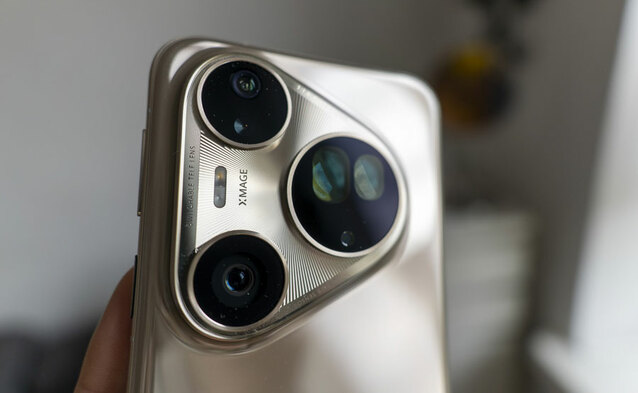Nokia poinformowała, że Windows Phone będzie jej głównym systemem operacyjnym dla smartfonów. Nokia zamierza połączyć z Microsoft swoje usługi. Nokia Maps (prawdopodobnie zrezygnowano z marki Ovi) będzie częścią nowej platformy, tak jak Bing i AdCenter. Aplikacji dla telefonów Nokia będą dostępne z poziomu Microsoft Marketplace. Nokia zamierza także sprzedawać telefony z Symbianem - około 150 mln nowych telefonów w najbliższych latach.
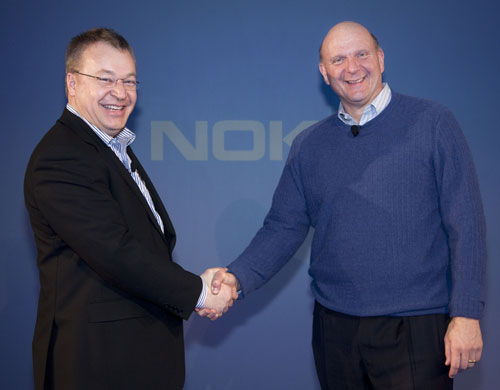 |
Meego ma nadal pozostać projektem open-source i Nokia planuje w tym roku dostarczyć produkty z tym systemem.
Fiński koncern utworzył Nokia Leadership Team, do którego będą należeć członkowie obecnego Group Executive Board: Stephen Elop, Esko Aho, Juha Akras, Jerri DeVard, Colin Giles, Rich Green, Jo Harlow, Timo Ihamuotila, Mary McDowell, Kai Oistamo, Tero Ojanpera, Louise Pentland i Niklas Savander. Z Nokii odchodzi Alberto Torres.
1 kwietnia br. Nokia będzie miała nową strukturę, na którą będą składać się dwa główne działy: Smart Devices i Mobile Phones, które będą skupiać się odpowiednio na smartfonach i telefonach komórkowych dla rynku masowego. Do działu Smart Devices kierowanego przez Ho Harlow, będą należeć (teraz w Mobile Solutions):
- Symbian Smartphones
- MeeGo Computers
- Strategic Business Operations
Dział Smart Devices będzie oczywiście odpowiedzialny za przygotowanie porfolio telefonów z Windows Phone.
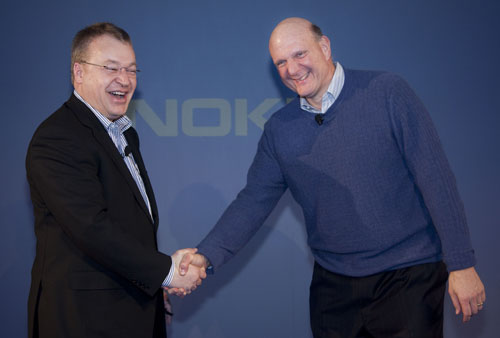 |
Dział Mobile Phones będzie kierowany przez Mary McDowell.
Pozostali szefowie działów:
-
Markets (sprzedaż) - Niklas Savander
-
Services and Developer Experience - Tero Ojanpera
-
NAVTEQ (nadal jako osobna firma) - Larry Kaplan
-
CTO Office - Rich Green
-
Design - Marko Ahtisaari
-
CFO Office - Timo Ihamuotila
-
Corporate Development - Kai Oistamo
-
Corporate Relations & Responsibility - Esko Aho
-
Human Resources - Juha Akras
-
Legal and Intellectual Property - Louise Pentland
-
Nokia Siemens Networks nadal pozostanie osobną firmą.
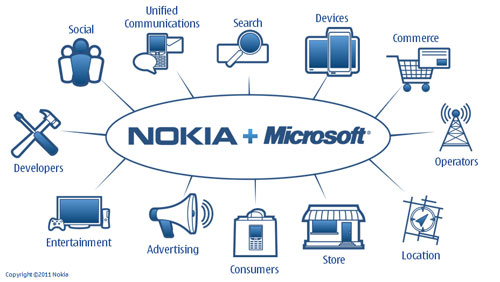 |
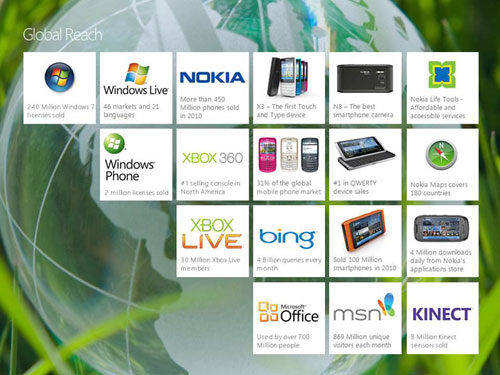 |
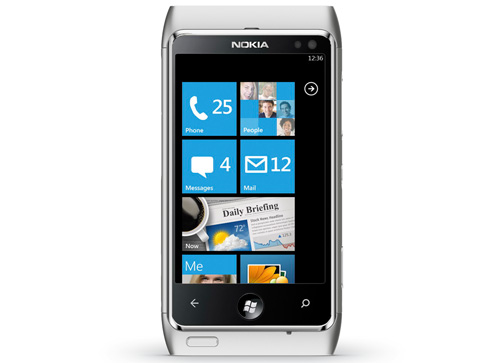 |
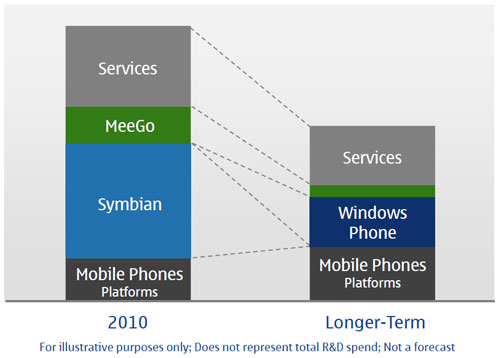
Szczegóły nowej strategii fińskiego producenta (ang.):
London, UK - Nokia today outlined its new strategic direction, including changes in leadership and operational structure to accelerate the company's speed of execution in a dynamic competitive environment.
Major elements of the new strategy include:
- Plans for a broad strategic partnership with Microsoft to build a new global mobile ecosystem; Windows Phone would serve as Nokia's primary smartphone platform.
- A renewed approach to capture volume and value growth to connect "the next billion" to the Internet in developing growth markets
- Focused investments in next-generation disruptive technologies
- A new leadership team and organizational structure with a clear focus on speed, results and accountability
"Nokia is at a critical juncture, where significant change is necessary and inevitable in our journey forward," said Stephen Elop, Nokia President and CEO. "Today, we are accelerating that change through a new path, aimed at regaining our smartphone leadership, reinforcing our mobile device platform and realizing our investments in the future."
Nokia plans to form a strategic partnership with Microsoft to build a global mobile ecosystem based on highly complementary assets. The Nokia-Microsoft ecosystem targets to deliver differentiated and innovative products and have unrivalled scale, product breadth, geographical reach, and brand identity. With Windows Phone as its primary smartphone platform, Nokia would help drive the future of the platform by leveraging its expertise on hardware optimization, software customization, language support and scale. Nokia and Microsoft would also combine services assets to drive innovation. Nokia Maps, for example, would be at the heart of key Microsoft assets like Bing and AdCenter, and Nokia's application and content store would be integrated into Microsoft Marketplace. Under the proposed partnership, Microsoft would provide developer tools, making it easier for application developers to leverage Nokia's global scale.
With Nokia's planned move to Windows Phone as its primary smartphone platform, Symbian becomes a franchise platform, leveraging previous investments to harvest additional value. This strategy recognizes the opportunity to retain and transition the installed base of 200 million Symbian owners. Nokia expects to sell approximately 150 million more Symbian devices in the years to come.
Under the new strategy, MeeGo becomes an open-source, mobile operating system project. MeeGo will place increased emphasis on longer-term market exploration of next-generation devices, platforms and user experiences. Nokia still plans to ship a MeeGo-related product later this year.
In feature phones, Nokia unveiled a renewed strategy to leverage its innovation and strength in growth markets to connect the next billion people to their first Internet and application experience.
New leadership team, operational structure
This new strategy is supported by significant changes in Nokia's leadership, operational structure and approach. Effective today, Nokia has a new leadership team with the commitment, competencies and innovative thinking needed in today's dynamic environment.
The Nokia Leadership Team, previously the Group Executive Board, will consist of the following members: Stephen Elop, Esko Aho, Juha Akras, Jerri DeVard, Colin Giles, Rich Green, Jo Harlow, Timo Ihamuotila, Mary McDowell, Kai Oistamo, Tero Ojanpera, Louise Pentland and Niklas Savander.
Alberto Torres has stepped down from the management team, effective February 10 to pursue other interests outside the company.
The renewed governance will expedite decision-making and improve time-to-market of products and innovations, placing a heavy focus on results, speed and accountability. The new strategy and operational structure are expected to have significant impact to Nokia operations and personnel.
New company structure
As of April 1, Nokia will have a new company structure, which features two distinct business units: Smart Devices and Mobile Phones. They will focus on Nokia's key business areas: high-end smartphones and mass-market mobile phones. Each unit will have profit-and-loss responsibility and end-to-end accountability for the full consumer experience, including product development, product management and product marketing.
Smart Devices will be responsible for building Nokia's leadership in smartphones and will be led by Jo Harlow. The following sub-units now in Mobile Solutions will move under Smart Devices:
- Symbian Smartphones
- MeeGo Computers
- Strategic Business Operations
To support the planned new partnership with Microsoft, Smart Devices will be responsible for creating a winning Windows Phone portfolio.
Mobile Phones will drive Nokia's "web for the next billion" strategy. Mobile Phones will leverage its innovation and strength in growth markets to connect the next billion people and bring them affordable access to the Internet and applications. The Mobile Phones unit will be led by Mary McDowell.
Markets will be responsible for selling products, executing compelling marketing and communications, creating a competitive local ecosystem, sourcing, customer care, manufacturing, IT and logistics across all Nokia products. It will be headed by Niklas Savander.
Services and Developer Experience will be responsible for Nokia's global services portfolio, developer offering, developer relations and integration of partner service offerings. Tero Ojanpera will lead the Services and Developer Experience unit in an acting capacity.
NAVTEQ, an integral part of Nokia's location and advertising business, will be headed by Larry Kaplan, and continue as a separate reporting entity.
The CTO Office will be responsible for Nokia's technology strategy and forward-looking technology activities, including Nokia Research Center. It will be headed by Rich Green.
Design, responsible for Nokia product and user experience design, will be led by Marko Ahtisaari.
The CFO Office, responsible for all financial activity, will be headed by Timo Ihamuotila.
Corporate Development, responsible for driving implementation of Nokia's ecosystem strategy and strategic partnerships, will be headed by Kai Oistamo.
Corporate Relations & Responsibility, responsible for Nokia's government and public affairs, sustainable development and social responsibility, will be led by Esko Aho.
Human Resources will be led by Juha Akras.
Legal and Intellectual Property will be led by Louise Pentland.
Nokia Siemens Networks continues in the Nokia Group as a separate reporting entity.
Nowe prognozy:
Targets and forecasts for Nokia and the mobile device industry
Nokia expects attractive mobile device industry revenue growth in 2011 and over the longer-term, driven by the further adoption of smartphones by consumers globally and the further adoption of mobile devices and services, particularly in emerging markets. Over the longer-term, Nokia expects mobile device industry gross margins to come under pressure due to competitive factors.
Due to the initiation of Nokia's strategic transformation on February 11, 2011, the full-year prospects for its Devices & Services business are subject to significant uncertainties, and therefore Nokia believes it is not appropriate to provide annual targets for 2011 at the present time. However, Nokia expects to continue to provide short-term quarterly forecasts to indicate its progress in the company's interim reports as well as annual targets when circumstances allow it to do so.
Nokia expects 2011 and 2012 to be transition years, as the company invests to build the planned winning ecosystem with Microsoft. After the transition, Nokia targets longer-term:
- Devices & Services net sales to grow faster than the market.
- Devices & Services non-IFRS* operating margin to be 10% or more.
Targets and forecasts for Nokia Siemens Networks and the mobile and fixed infrastructure and related services market
Nokia and Nokia Siemens Networks expect overall industry revenue to grow slightly in 2011, compared to 2010. While growth is expected in certain areas, such as mobile broadband and services, this is expected to be offset to some extent by declines in certain areas and a continued challenging competitive environment.
Due to Nokia Siemens Networks' solid position in industry growth areas, Nokia and Nokia Siemens Networks target:
- Nokia Siemens Networks net sales to grow faster than the market in 2011.
- Nokia Siemens Networks non-IFRS* operating margin to be above breakeven in 2011.
Additionally, Nokia and Nokia Siemens Networks continue to target Nokia Siemens Networks to reduce its non-IFRS* annualized operating expenses and production overheads by EUR 500 million by the end of 2011, compared to the end of 2009.
Companies plan to combine assets and develop innovative mobile products on an unprecedented scale
London, Feb. 11, 2011 - Nokia and Microsoft today announced plans to form a broad strategic partnership that would use their complementary strengths and expertise to create a new global mobile ecosystem.
Nokia and Microsoft intend to jointly create market-leading mobile products and services designed to offer consumers, operators and developers unrivalled choice and opportunity. As each company would focus on its core competencies, the partnership would create the opportunity for rapid time to market execution. Additionally, Nokia and Microsoft plan to work together to integrate key assets and create completely new service offerings, while extending established products and services to new markets.
Under the proposed partnership:
- Nokia would adopt Windows Phone as its principal smartphone strategy, innovating on top of the platform in areas such as imaging, where Nokia is a market leader.
- Nokia would help drive the future of Windows Phone. Nokia would contribute its expertise on hardware design, language support, and help bring Windows Phone to a larger range of price points, market segments and geographies.
- Nokia and Microsoft would closely collaborate on joint marketing initiatives and a shared development roadmap to align on the future evolution of mobile products.
- Bing would power Nokia's search services across Nokia devices and services, giving customers access to Bing's next generation search capabilities. Microsoft adCenter would provide search advertising services on Nokia's line of devices and services.
- Nokia Maps would be a core part of Microsoft's mapping services. For example, Maps would be integrated with Microsoft's Bing search engine and adCenter advertising platform to form a unique local search and advertising experience
- Nokia's extensive operator billing agreements would make it easier for consumers to purchase Nokia Windows Phone services in countries where credit-card use is low.
- Microsoft development tools would be used to create applications to run on Nokia Windows Phones, allowing developers to easily leverage the ecosystem's global reach.
- Nokia's content and application store would be integrated with Microsoft Marketplace for a more compelling consumer experience.
"Today, developers, operators and consumers want compelling mobile products, which include not only the device, but the software, services, applications and customer support that make a great experience," Stephen Elop, Nokia President and CEO, said at a joint news conference in London. "Nokia and Microsoft will combine our strengths to deliver an ecosystem with unrivalled global reach and scale. It's now a three-horse race."
"I am excited about this partnership with Nokia," said Steven A. Ballmer, Microsoft CEO. "Ecosystems thrive when fueled by speed, innovation and scale. The partnership announced today provides incredible scale, vast expertise in hardware and software innovation and a proven ability to execute."
List otwarty szefów Nokia i Microsoft:
Open Letter from CEO Stephen Elop, Nokia and CEO Steve Ballmer, Microsoft
BY STEPHEN ELOP AND STEVE BALLMER POSTED ON THE 11TH OF FEBRUARY 2011 AT 7:20AM
GLOBAL – Today in London, our two companies announced plans for a broad strategic partnership that combines the respective strengths of our companies and builds a new global mobile ecosystem. The partnership increases our scale, which will result in significant benefits for consumers, developers, mobile operators and businesses around the world. We both are incredibly excited about the journey we are on together.
While the specific details of the deal are being worked out, here’s a quick summary of what we are working towards:
• Nokia will adopt Windows Phone as its primary smartphone strategy, innovating on top of the platform in areas such as imaging, where Nokia is a market leader.
• Nokia will help drive and define the future of Windows Phone. Nokia will contribute its expertise on hardware design, language support, and help bring Windows Phone to a larger range of price points, market segments and geographies.
• Nokia and Microsoft will closely collaborate on development, joint marketing initiatives and a shared development roadmap to align on the future evolution of mobile products.
• Bing will power Nokia’s search services across Nokia devices and services, giving customers access to Bing’s next generation search capabilities. Microsoft adCenter will provide search advertising services on Nokia’s line of devices and services.
• Nokia Maps will be a core part of Microsoft’s mapping services. For example, Maps would be integrated with Microsoft’s Bing search engine and adCenter advertising platform to form a unique local search and advertising experience.
• Nokia’s extensive operator billing agreements will make it easier for consumers to purchase Nokia Windows Phone services in countries where credit-card use is low.
• Microsoft development tools will be used to create applications to run on Nokia Windows Phones, allowing developers to easily leverage the ecosystem’s global reach.
• Microsoft will continue to invest in the development of Windows Phone and cloud services so customers can do more with their phone, across their work and personal lives.
• Nokia’s content and application store will be integrated with Microsoft Marketplace for a more compelling consumer experience.
We each bring incredible assets to the table. Nokia’s history of innovation in the hardware space, global hardware scale, strong history of intellectual property creation and navigation assets are second to none. Microsoft is a leader in software and services; the company’s incredible expertise in platform creation forms the opportunity for its billions of customers and millions of partners to get more out of their devices.
Together, we have some of the world’s most admired brands, including Windows, Office, Bing, Xbox Live, NAVTEQ and Nokia. We also have a shared understanding of what it takes to build and sustain a mobile ecosystem, which includes the entire experience from the device to the software to the applications, services and the marketplace.
Today, the battle is moving from one of mobile devices to one of mobile ecosystems, and our strengths here are complementary. Ecosystems thrive when they reach scale, when they are fueled by energy and innovation and when they provide benefits and value to each person or company who participates. This is what we are creating; this is our vision; this is the work we are driving from this day forward.
There are other mobile ecosystems. We will disrupt them.
There will be challenges. We will overcome them.
Success requires speed. We will be swift.
Together, we see the opportunity, and we have the will, the resources and the drive to succeed.
List do deweloperów:
Letter to Developers about Today’s News
Nokia and Microsoft today announced plans to form a broad strategic partnership that would combine our complementary strengths and expertise to create a new global mobile ecosystem, one we believe would have all the elements needed to fuel innovation – including search, location, advertising and exciting new devices.
As part of this, Nokia plans to adopt Windows Phone as our primary smartphone strategy, helping drive the future of the platform. This has not been a decision taken lightly by Nokia and we wanted to share some of the key points with our developer community.
Nokia and Microsoft together
The Nokia-Microsoft ecosystem would aim to deliver differentiated and innovative products and have unrivalled scale, product breadth, geographical reach, and brand identity. With Windows Phone as our primary smartphone platform, we would help drive the future of the platform by leveraging our expertise in hardware optimization, software customization, language support and scale.
Microsoft would make available the existing free Windows Phone Developer Tools; Visual Studio 2010, Expression, Silverlight and the XNA Framework to developers. Together, we will provide guidance for developers wishing to port their applications to Windows Phone.
Nokia and Microsoft would also combine services assets to drive innovation. Nokia’s Ovi Maps, for example, would be at the heart of key Microsoft assets like Bing and AdCenter, and Nokia’s application and content store would be integrated with Microsoft Marketplace for Nokia Windows Phones, to deliver a great single commerce experience for developers and consumers alike.
The Qt ecosystem
Qt will continue to be the development framework for Symbian and Nokia will use Symbian for further devices; continuing to develop strategic applications in Qt for Symbian platform and encouraging application developers to do the same. With 200 million users worldwide and Nokia planning to sell around 150 million more Symbian devices, Symbian still offers unparalleled geographical scale for developers.
Extending the scope of Qt further will be our first MeeGo-related open source device, which we plan to ship later this year. Though our plans for MeeGo have been adapted in light of our planned partnership with Microsoft, that device will be compatible with applications developed within the Qt framework and so give Qt developers a further device to target.
Nokia Mobile Phones
Nokia Mobile Phones will drive Nokia’s ”web for the next billion” strategy, leveraging Nokia’s innovation and strength in growth markets to connect the next billion people and bring them affordable access to the Internet and applications. This represents a further opportunity for developers. Nokia will leverage our proxy browser technology on mobile phones, as well as continuing to enhance Java support and SDKs, with developers and publishers able to deliver their applications to consumers through the Nokia store.
Supporting our developers
As part of the change in Nokia’s organization announced today, the Services and Developer Experiences (SDX) unit will be responsible for Nokia’s global service portfolio, developer offering, developer community relations, and integration of partner service offering. Forum Nokia will be part of that unit and will continue to support developers for Symbian smartphones and Series 40 mobile phones.
We will strengthen our ability to support developers both globally and in local markets, ensuring that we can work with you wherever you are to bring your latest applications to our store and help you leverage the global revenue opportunity with Symbian and Series 40.
For Nokia Windows Phones, Microsoft would provide tools for application developers to easily and rapidly leverage Nokia’s market reach. The integration of Microsoft Marketplace and Nokia’s content and application store would provide scalable infrastructure and compelling consumer engagement for applications for Nokia Windows Phones.
The combined stores would offer unparalleled distribution. The Ovi Store already delivers content in 190 countries, with local specific content in 90 of those. We are now seeing 4 million downloads a day, with 300,000 users signing up daily and 400,000 developers now working on applications for Nokia on Symbian. In addition to offering operator billing with 103 operators in 32 countries, we plan to support the widest range of business models for our publishers and developers.
We plan to make it easy and profitable for all developers to thrive in the ecosystem, taking advantage of the enablers (API’s) offered by ourselves, Microsoft and other partners - including location, search, monetization and advertising.
What’s next?
As we said, this announcement is about our plans to work with Microsoft and the planning will continue. Our aim is to keep you informed as plans develop, through our Forum Nokia and Ovi Publish websites, newsletters and in person. In the meantime, we want to help you maximize the existing business opportunity, developing for the approximately 50 million Qt capable Symbian smartphones already in use and approximately 150 million more that we target to sell, as well as hundreds of millions of Nokia mobile phones.
We think this is going to be an exciting journey and look forward to having you with us!
Purnima Kochikar
Head of Forum Nokia & Developer Community
Opinie:
Opinie archiwalne (11):
KomentujKomentarze / 11
Dodaj komentarz-

-

-

-
 fresh pisze: 2011-02-11 13:17Nokia wbiła sobie ostatni gwozdz do trumny SZOK , wolalbym zeby postawili na androida, wp7 jakos sie nie kupil i nie kupi Amen
fresh pisze: 2011-02-11 13:17Nokia wbiła sobie ostatni gwozdz do trumny SZOK , wolalbym zeby postawili na androida, wp7 jakos sie nie kupil i nie kupi Amen -
 Bebun pisze: 2011-02-11 14:47Moim zdaniem to te firmy dobrze się dobrały. Jako "śpiochy"(Microsoft przespał i za późno wprowadził system, Nokia zbyt długo obstawiała symbiana)będą razem się wspierały marketingowo i ugryźć jeszcze kawałek rynku lub zminimalizować straty. Obawiam się niestety, że w wyniku współpracy nie należy oczekiwać upowszechnienia WP7 na masowy rynek, gdyż Nokia produkuje zbyt drogie słuchawki (porównując z Samsungiem, LG,).Obym się mylił i chcę aby można było kupić smartphona z WP7 w markecie za ok 1tys
Bebun pisze: 2011-02-11 14:47Moim zdaniem to te firmy dobrze się dobrały. Jako "śpiochy"(Microsoft przespał i za późno wprowadził system, Nokia zbyt długo obstawiała symbiana)będą razem się wspierały marketingowo i ugryźć jeszcze kawałek rynku lub zminimalizować straty. Obawiam się niestety, że w wyniku współpracy nie należy oczekiwać upowszechnienia WP7 na masowy rynek, gdyż Nokia produkuje zbyt drogie słuchawki (porównując z Samsungiem, LG,).Obym się mylił i chcę aby można było kupić smartphona z WP7 w markecie za ok 1tys -
 Preza pisze: 2011-02-11 15:15Oj nie grzebcie Nokii przedwczesnie. W7 wystartowal pozno, ale nie jest wcale skonczony. Spokojnie. Tak jak Bebun pisze to sa 2 dobre maszyny tylko musza sie rozpedzic.
Preza pisze: 2011-02-11 15:15Oj nie grzebcie Nokii przedwczesnie. W7 wystartowal pozno, ale nie jest wcale skonczony. Spokojnie. Tak jak Bebun pisze to sa 2 dobre maszyny tylko musza sie rozpedzic. -
 tkubon pisze: 2011-02-11 18:35Jeśli Windows7 będzie dobrze zrobiony, a następne wersje jeszcze lepsze z duża ilością aplikacji tak jak w Apple oraz będzie to stabilnie działaś synchronizować się itd. w połączeniu z solidnym wykonaniem telefonów nokii to może to być poważna konkurencja dla Apple.
tkubon pisze: 2011-02-11 18:35Jeśli Windows7 będzie dobrze zrobiony, a następne wersje jeszcze lepsze z duża ilością aplikacji tak jak w Apple oraz będzie to stabilnie działaś synchronizować się itd. w połączeniu z solidnym wykonaniem telefonów nokii to może to być poważna konkurencja dla Apple. -
 Snackpol pisze: 2011-02-12 10:50Świetna robota ! Czekam na ofekty współpracy tych dwóch korporacji. Nokia !!!
Snackpol pisze: 2011-02-12 10:50Świetna robota ! Czekam na ofekty współpracy tych dwóch korporacji. Nokia !!! -
 Jurek pisze: 2011-02-12 15:52O tym jak Jełop sprzedał Nokię firmie M$; nokia zeszła z piedestału. Teraz juz jest normalna firemką jak kazda. Straciła .... coś, co traci sie raz. Show must go on... czy jakos tak. R.I.P. Tak kiedys popłynął Ericsson i Phillips... szkoda bo to Europa odchodzi... jakby w nowa epokę. Chyba przejdę na wyroby żółtych braci. :)
Jurek pisze: 2011-02-12 15:52O tym jak Jełop sprzedał Nokię firmie M$; nokia zeszła z piedestału. Teraz juz jest normalna firemką jak kazda. Straciła .... coś, co traci sie raz. Show must go on... czy jakos tak. R.I.P. Tak kiedys popłynął Ericsson i Phillips... szkoda bo to Europa odchodzi... jakby w nowa epokę. Chyba przejdę na wyroby żółtych braci. :) -
 olo pisze: 2011-02-12 16:59WM7 2% rynku, Symbian nadal sprzedaje sie ilosci ok 28% No comments :) Trzeba byc qretynem zeby wiazac sie z M$
olo pisze: 2011-02-12 16:59WM7 2% rynku, Symbian nadal sprzedaje sie ilosci ok 28% No comments :) Trzeba byc qretynem zeby wiazac sie z M$ -
 kaziu pisze: 2011-02-12 19:15prawda jest taka: MS nie miał sam dobrego modelu smartfona, a to co próbowali 1-2 lata temu wprowadzić nie przyjeło się. nokia ma problem z symbianem z którego nie daje sie zbyt dużo wyciągnąć. pamiętacie wczesną wspólpracę htc i MS. ktoś musiał kogoś wyręczyć. kiedyś erricson stracił dobre pomysły, połaczyli się z sony=tragiczne pomysły.
kaziu pisze: 2011-02-12 19:15prawda jest taka: MS nie miał sam dobrego modelu smartfona, a to co próbowali 1-2 lata temu wprowadzić nie przyjeło się. nokia ma problem z symbianem z którego nie daje sie zbyt dużo wyciągnąć. pamiętacie wczesną wspólpracę htc i MS. ktoś musiał kogoś wyręczyć. kiedyś erricson stracił dobre pomysły, połaczyli się z sony=tragiczne pomysły.
Rekomendowane:
Akcje partnerskie:

Prawdziwa fotograficzna rewolucja tego roku

To teraz najbardziej topowy robot sprzątający i jest w bardzo dobrej cenie

To najlepsze oferty na komórkę i internet stacjonarny
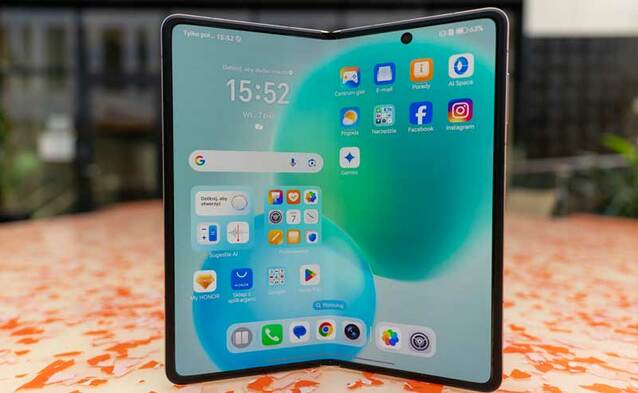
 Nokia Strategy and Financial Briefing [2 MB]
Nokia Strategy and Financial Briefing [2 MB]